I received the following letter from **** bank in my mailbox in Houston, Texas last month. I have been a client for around 7-8 years and have used the same address during all that time. The letter was slightly edited to protect the privacy of the OP. (I would enclose the text of the letter in one set of blockquotes if I could)
Attention Required: Update your address to keep your account open.
Dear Mr. Barley,
During a recent review of your account ending in XXXX, we've identified that your
physical address on file is an agency for receiving commercial mail (for example, USPS,
UPS, or P.O. boxes).
Because of government requirements, you'll need to sign into your account at
[link under review] and update your physical address. Please note that your mailing
address will remain the same.
If your physical address isn't updated by 5/15/2023, we'll have to put your account(s) on
hold. And unfortunately, if your address isn't updated by 6/14/2023, we'll have to close
your account(s). We don't want this to happen.
If you have issues updating your address online, or have any questions, give us a call at
*****, from Monday-Friday 8 a.m.- 5 p.m. ET. Please use Case Reference _____ _
#XXXXXXX when you contact us. We'll be happy to help you.
Thanks,
****










